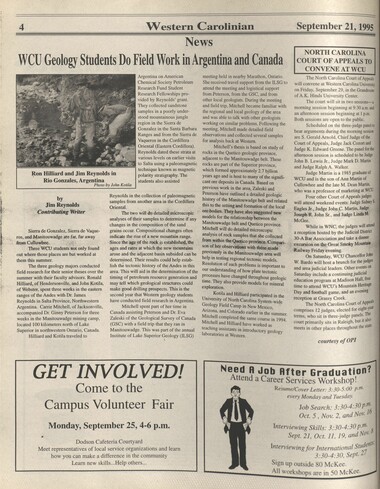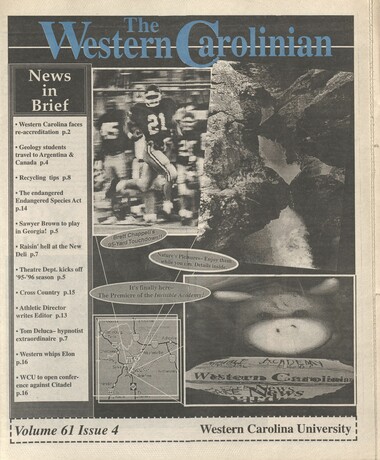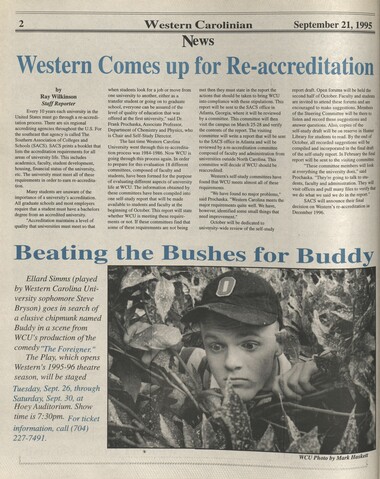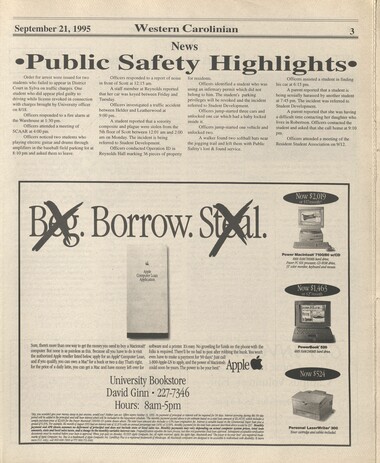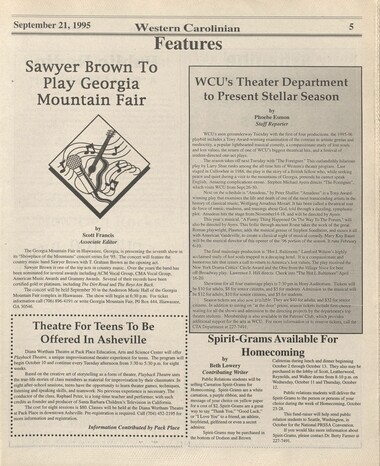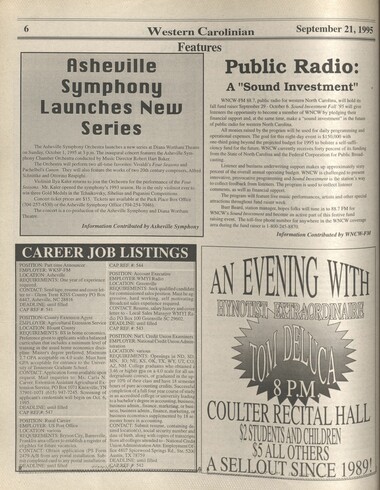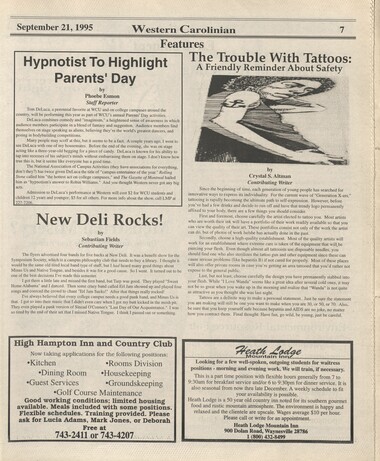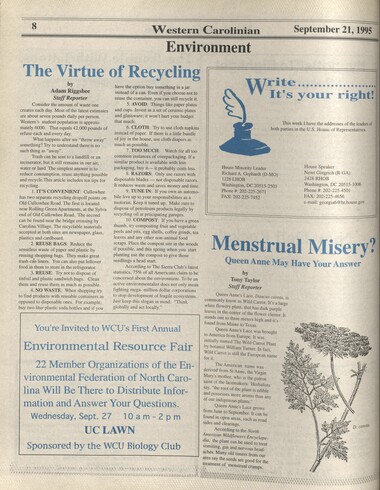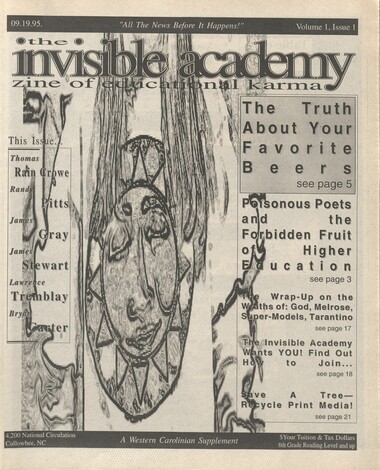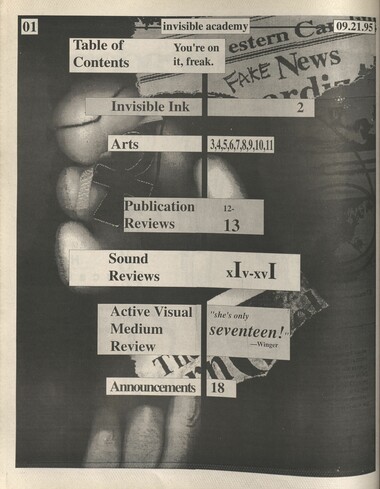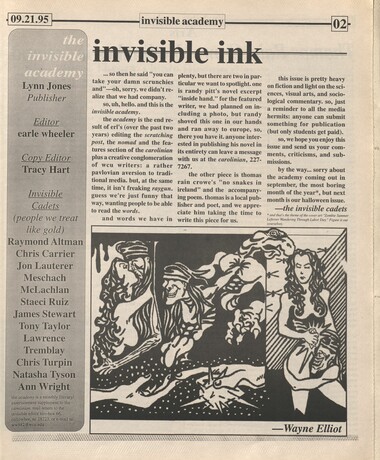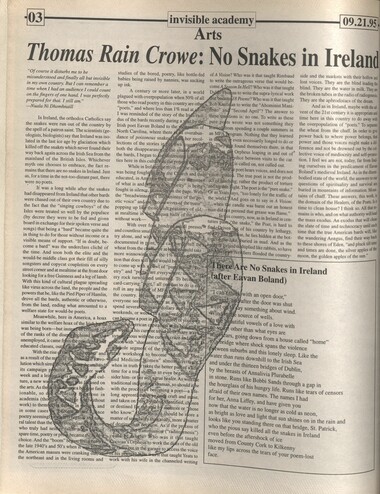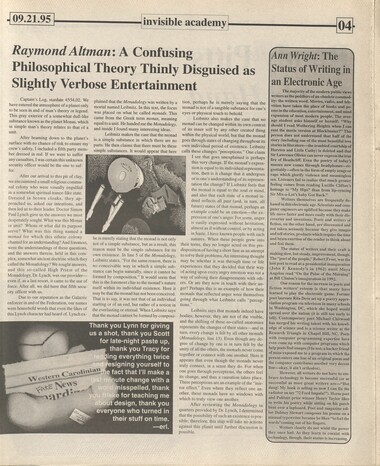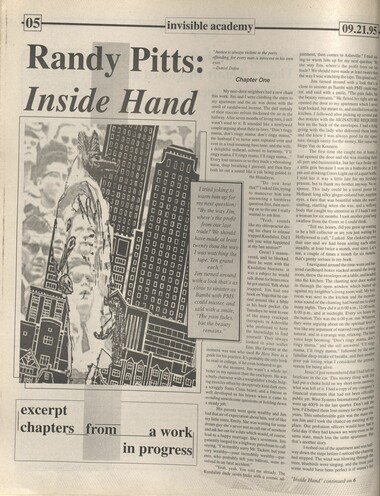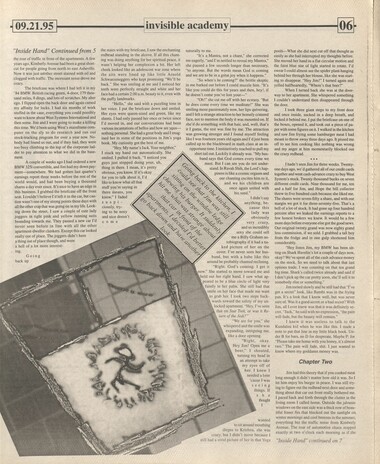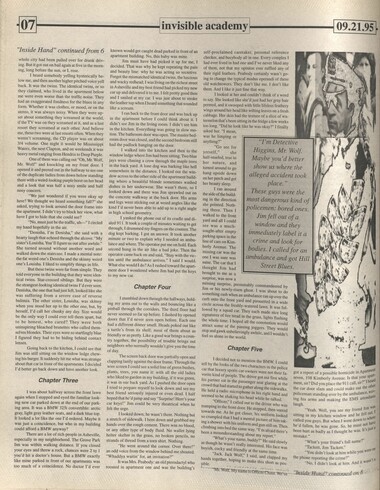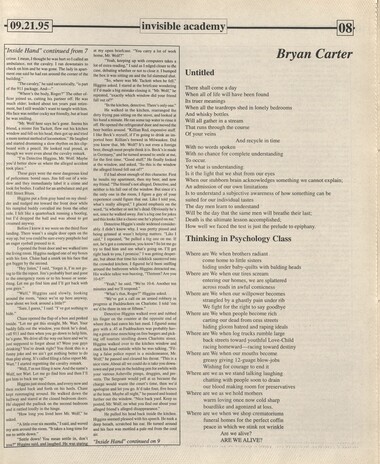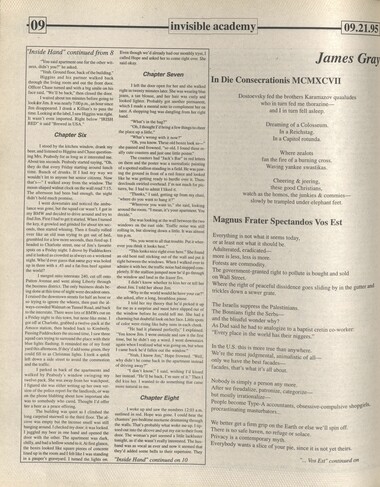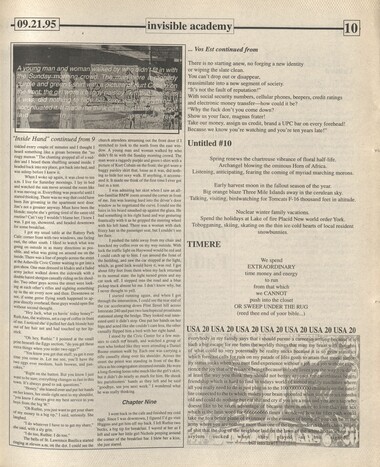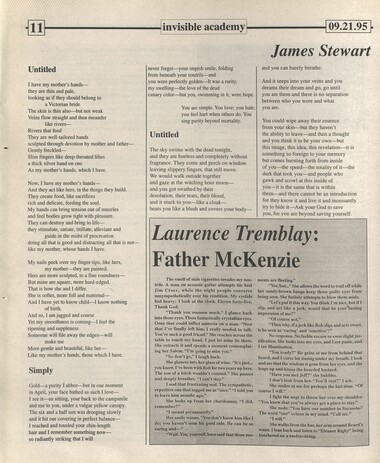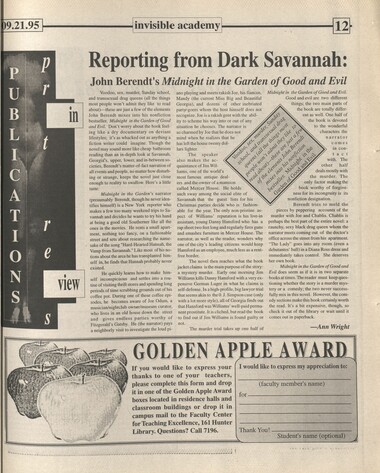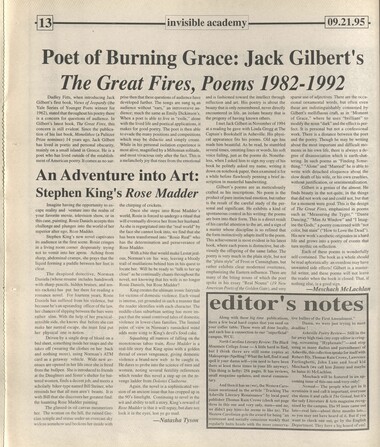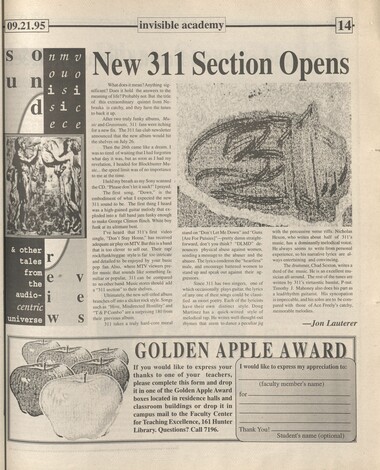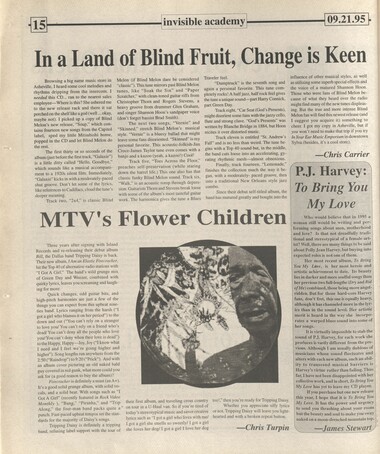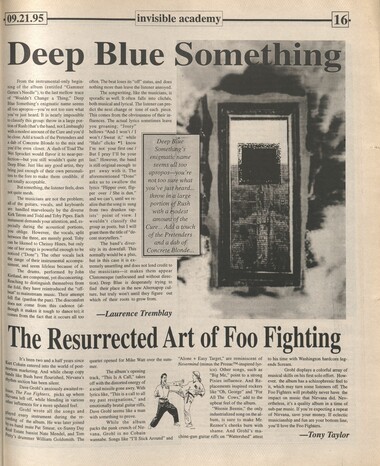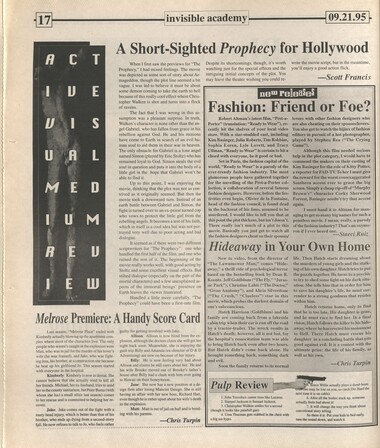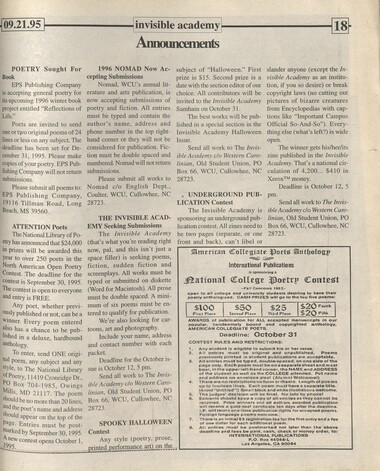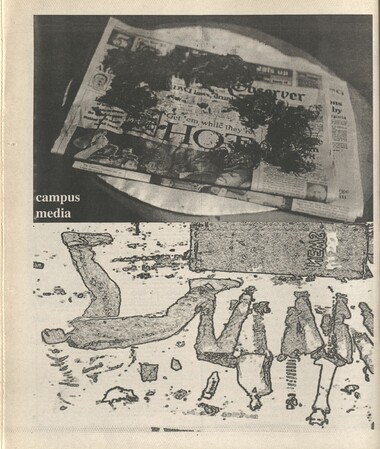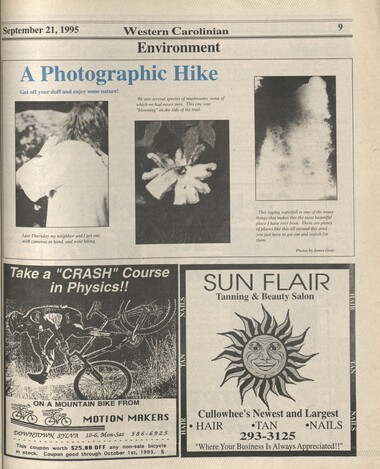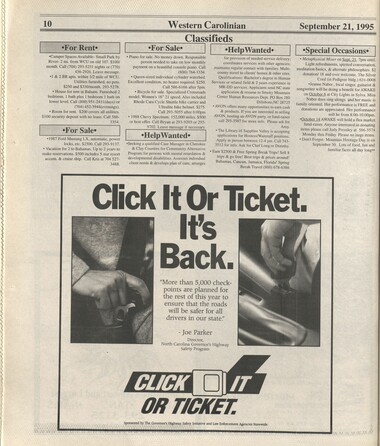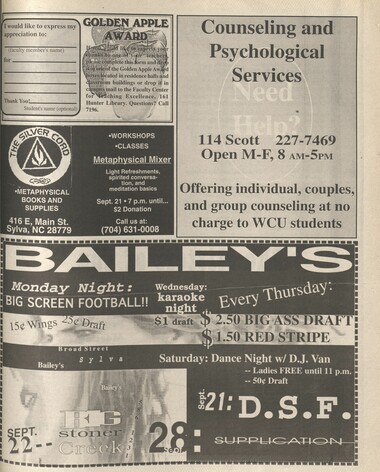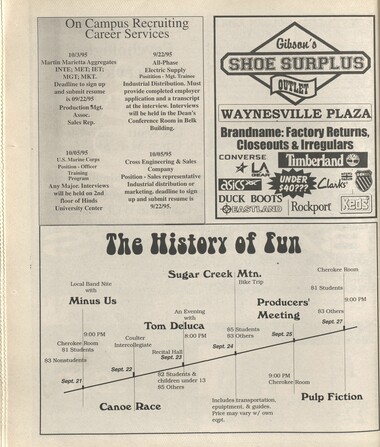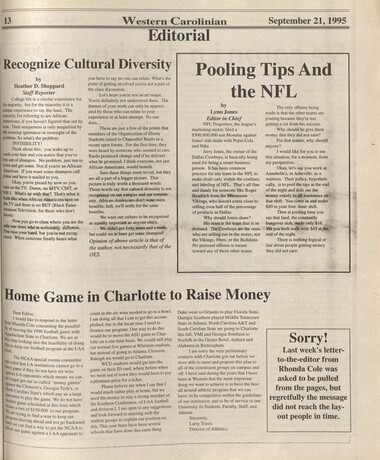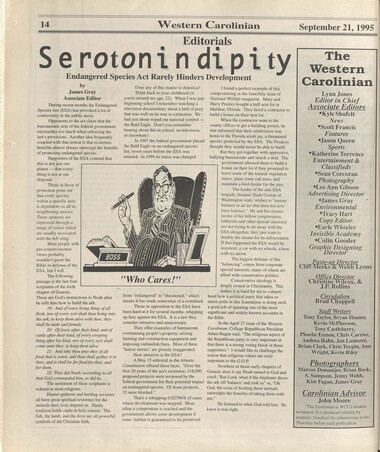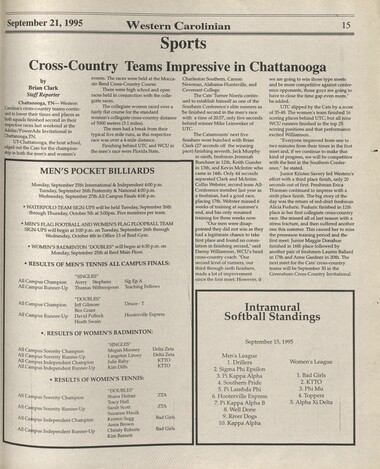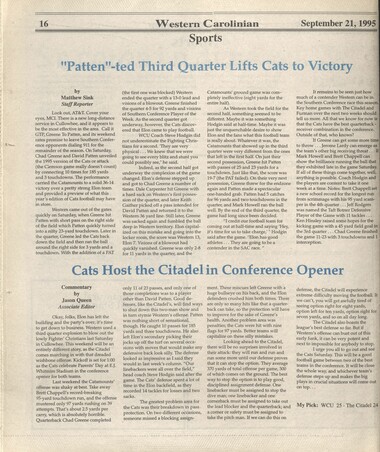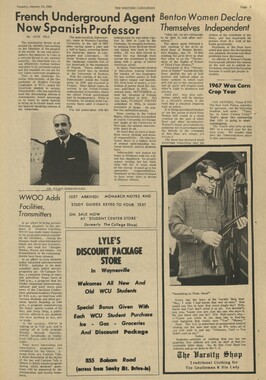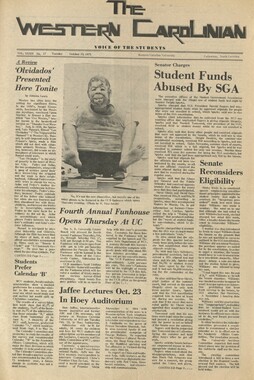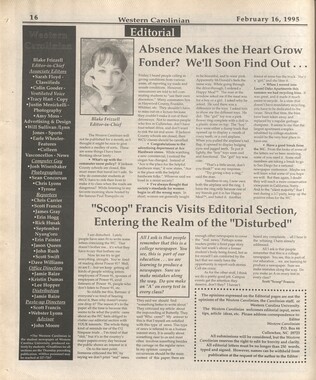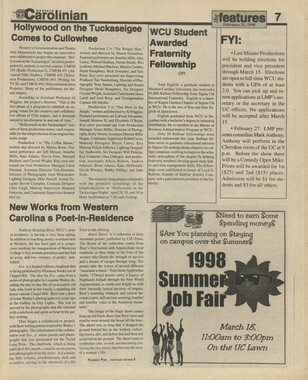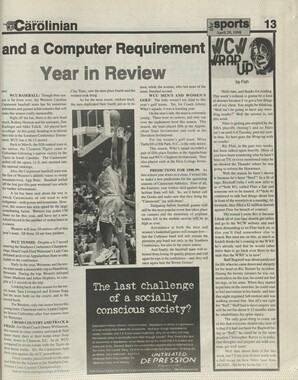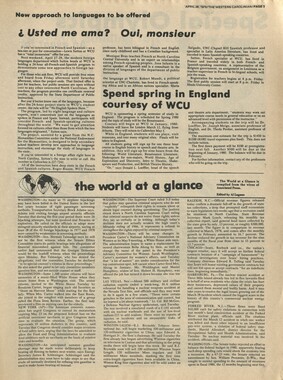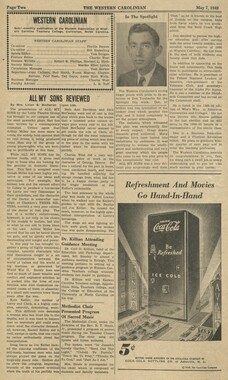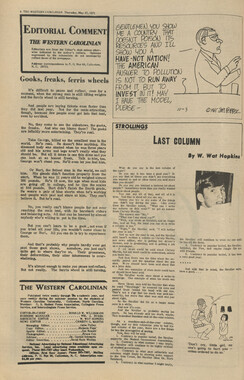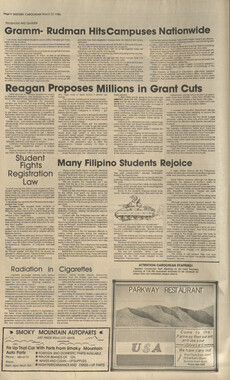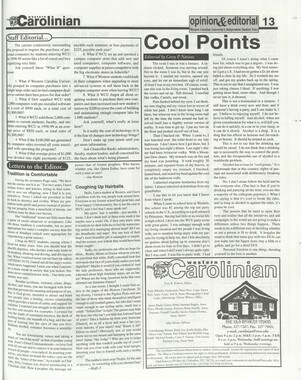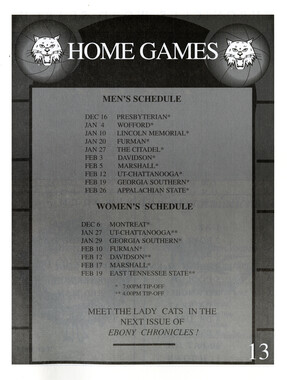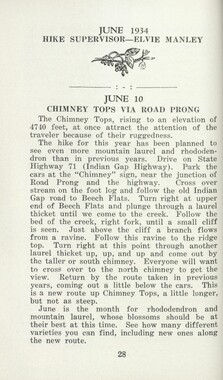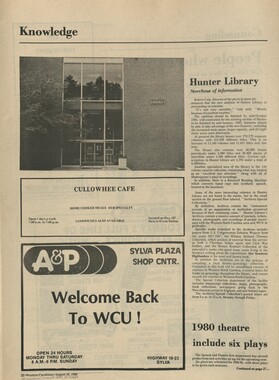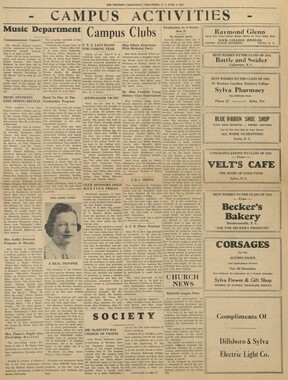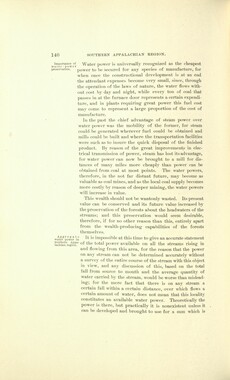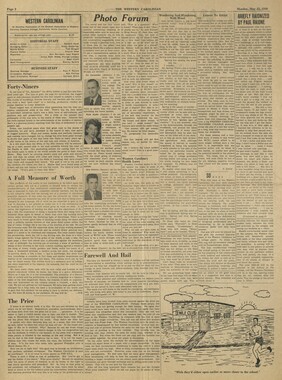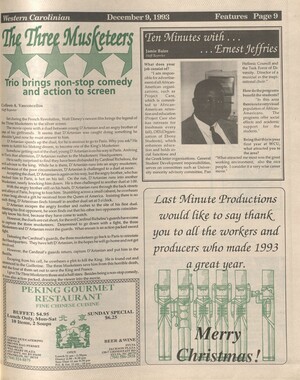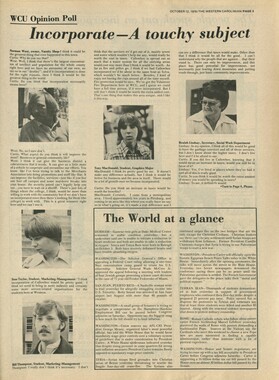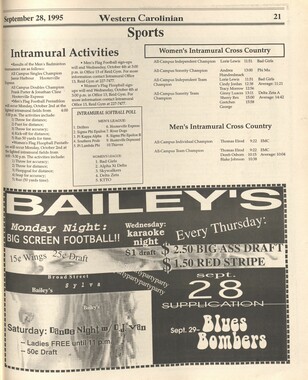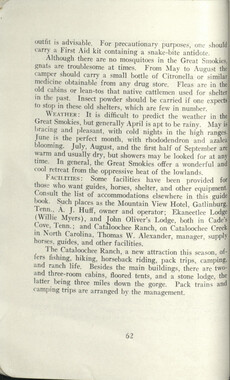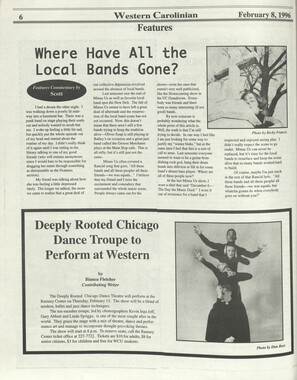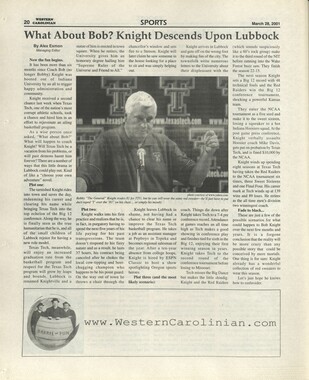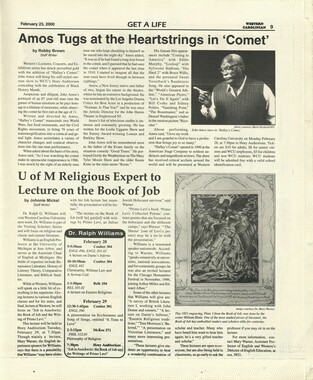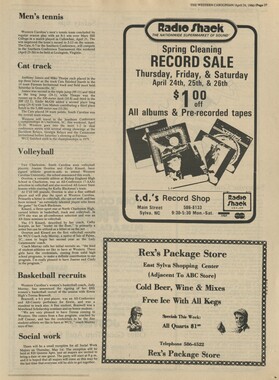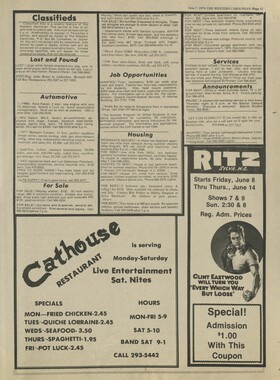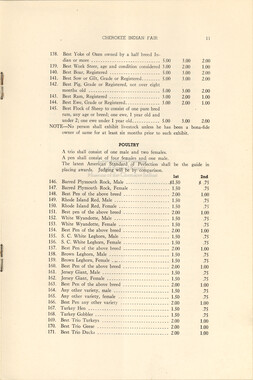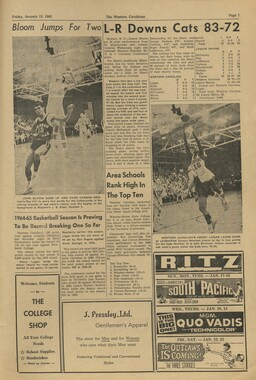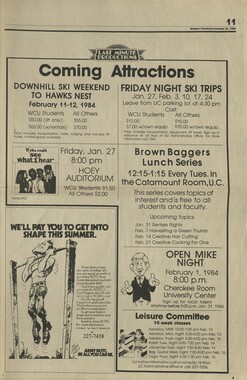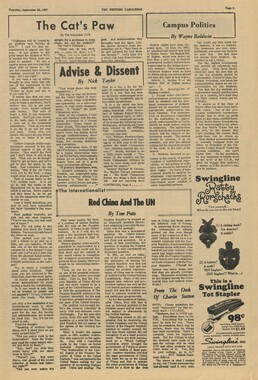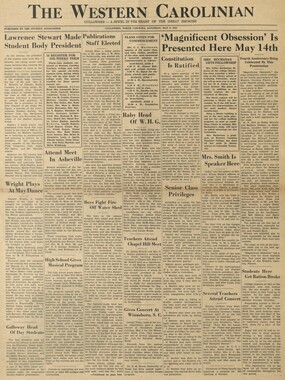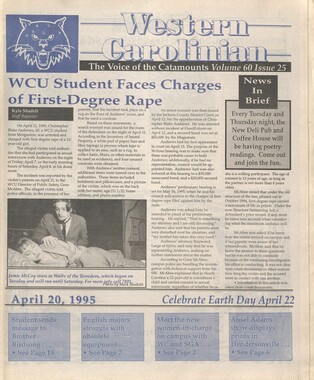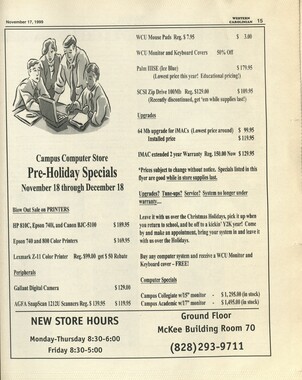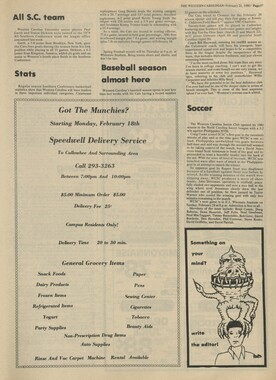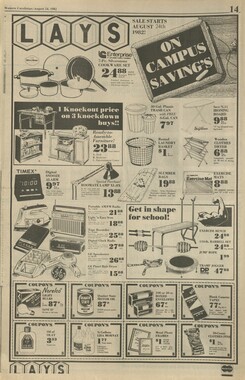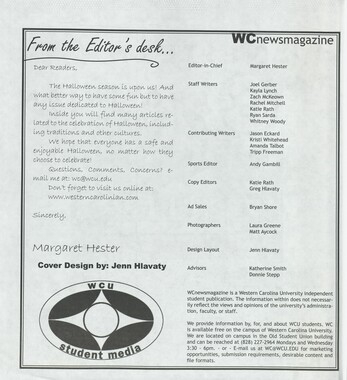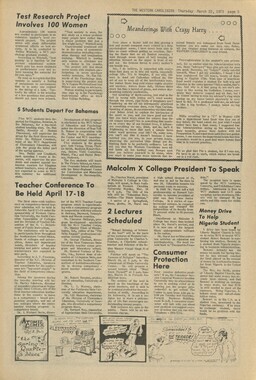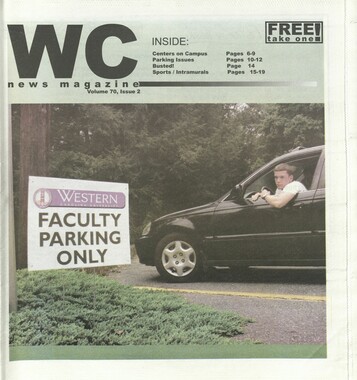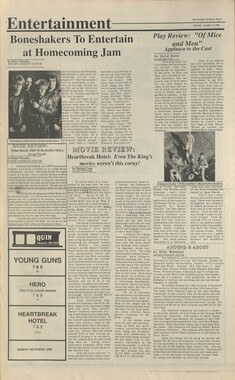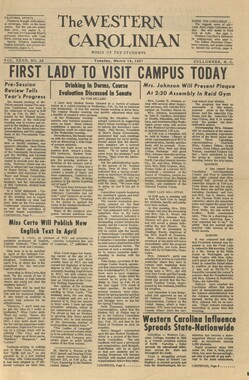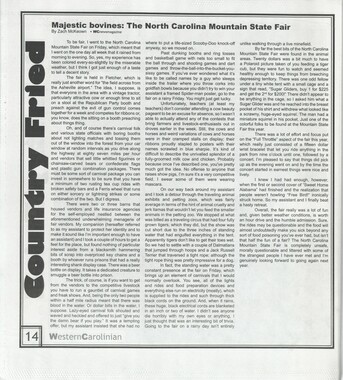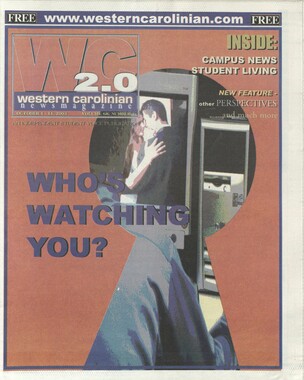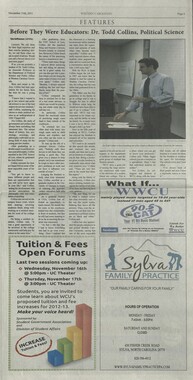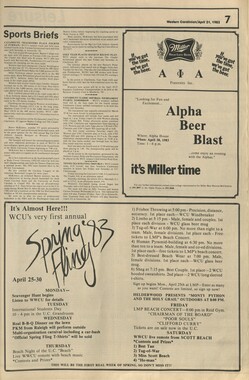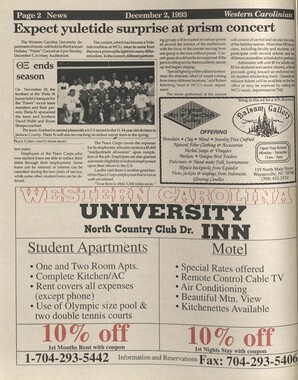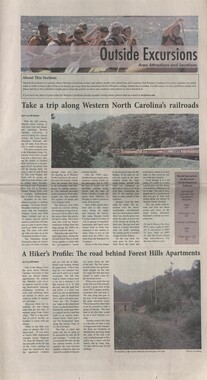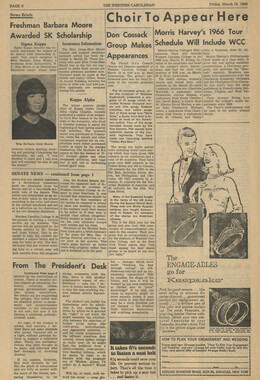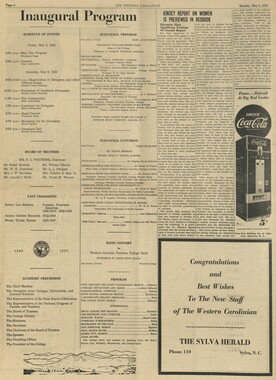Western Carolina University (20)
View all
- Canton Champion Fibre Company (2308)
- Cherokee Traditions (291)
- Civil War in Southern Appalachia (165)
- Craft Revival (1942)
- Great Smoky Mountains - A Park for America (2946)
- Highlights from Western Carolina University (430)
- Horace Kephart (941)
- Journeys Through Jackson (159)
- LGBTQIA+ Archive of Jackson County (85)
- Oral Histories of Western North Carolina (314)
- Picturing Appalachia (6873)
- Stories of Mountain Folk (413)
- Travel Western North Carolina (160)
- Western Carolina University Fine Art Museum Vitreograph Collection (129)
- Western Carolina University Herbarium (92)
- Western Carolina University: Making Memories (738)
- Western Carolina University Publications (2491)
- Western Carolina University Restricted Electronic Theses and Dissertations (146)
- Western North Carolina Regional Maps (71)
- World War II in Southern Appalachia (131)
University of North Carolina Asheville (6)
View all
- Allanstand Cottage Industries (62)
- Appalachian National Park Association (53)
- Bennett, Kelly, 1890-1974 (1463)
- Berry, Walter (76)
- Brasstown Carvers (40)
- Carver, George Washington, 1864?-1943 (26)
- Cathey, Joseph, 1803-1874 (1)
- Champion Fibre Company (233)
- Champion Paper and Fibre Company (297)
- Cherokee Indian Fair Association (16)
- Cherokee Language Program (22)
- Crowe, Amanda (40)
- Edmonston, Thomas Benton, 1842-1907 (7)
- Ensley, A. L. (Abraham Lincoln), 1865-1948 (275)
- Fromer, Irving Rhodes, 1913-1994 (70)
- George Butz (BFS 1907) (46)
- Goodrich, Frances Louisa (120)
- Grant, George Alexander, 1891-1964 (96)
- Heard, Marian Gladys (60)
- Kephart, Calvin, 1883-1969 (15)
- Kephart, Horace, 1862-1931 (313)
- Kephart, Laura, 1862-1954 (39)
- Laney, Gideon Thomas, 1889-1976 (439)
- Masa, George, 1881-1933 (61)
- McElhinney, William Julian, 1896-1953 (44)
- Niggli, Josephina, 1910-1983 (10)
- North Carolina Park Commission (105)
- Osborne, Kezia Stradley (9)
- Owens, Samuel Robert, 1918-1995 (11)
- Penland Weavers and Potters (36)
- Roberts, Vivienne (15)
- Roth, Albert, 1890-1974 (142)
- Schenck, Carl Alwin, 1868-1955 (1)
- Sherrill's Photography Studio (2565)
- Southern Highland Handicraft Guild (127)
- Southern Highlanders, Inc. (71)
- Stalcup, Jesse Bryson (46)
- Stearns, I. K. (213)
- Thompson, James Edward, 1880-1976 (226)
- United States. Indian Arts and Crafts Board (130)
- USFS (683)
- Vance, Zebulon Baird, 1830-1894 (1)
- Weaver, Zebulon, 1872-1948 (58)
- Western Carolina College (230)
- Western Carolina Teachers College (282)
- Western Carolina University (2008)
- Western Carolina University. Mountain Heritage Center (18)
- Whitman, Walt, 1819-1892 (10)
- Wilburn, Hiram Coleman, 1880-1967 (73)
- Williams, Isadora (3)
- Cain, Doreyl Ammons (0)
- Crittenden, Lorraine (0)
- Rhodes, Judy (0)
- Smith, Edward Clark (0)
- Appalachian Region, Southern (2569)
- Asheville (N.C.) (1923)
- Avery County (N.C.) (26)
- Blount County (Tenn.) (195)
- Buncombe County (N.C.) (1672)
- Cherokee County (N.C.) (283)
- Clay County (N.C.) (555)
- Graham County (N.C.) (236)
- Great Smoky Mountains National Park (N.C. and Tenn.) (519)
- Haywood County (N.C.) (3569)
- Henderson County (N.C.) (70)
- Jackson County (N.C.) (4912)
- Knox County (Tenn.) (35)
- Knoxville (Tenn.) (13)
- Lake Santeetlah (N.C.) (10)
- Macon County (N.C.) (420)
- Madison County (N.C.) (215)
- McDowell County (N.C.) (39)
- Mitchell County (N.C.) (132)
- Polk County (N.C.) (35)
- Qualla Boundary (982)
- Rutherford County (N.C.) (76)
- Swain County (N.C.) (2182)
- Transylvania County (N.C.) (270)
- Watauga County (N.C.) (12)
- Waynesville (N.C.) (86)
- Yancey County (N.C.) (72)
- Aerial Photographs (3)
- Aerial Views (60)
- Albums (books) (4)
- Articles (1)
- Artifacts (object Genre) (228)
- Bibliographies (1)
- Biography (general Genre) (2)
- Cards (information Artifacts) (38)
- Clippings (information Artifacts) (191)
- Copybooks (instructional Materials) (3)
- Crafts (art Genres) (622)
- Depictions (visual Works) (21)
- Design Drawings (1)
- Drawings (visual Works) (185)
- Envelopes (73)
- Exhibitions (events) (1)
- Facsimiles (reproductions) (1)
- Fiction (general Genre) (4)
- Financial Records (12)
- Fliers (printed Matter) (67)
- Glass Plate Negatives (381)
- Guidebooks (2)
- Internegatives (10)
- Interviews (815)
- Land Surveys (102)
- Letters (correspondence) (1013)
- Manuscripts (documents) (618)
- Maps (documents) (177)
- Memorandums (25)
- Minutes (administrative Records) (59)
- Negatives (photographs) (6090)
- Newsletters (1290)
- Newspapers (2)
- Notebooks (8)
- Occupation Currency (1)
- Paintings (visual Works) (1)
- Pen And Ink Drawings (1)
- Periodicals (193)
- Personal Narratives (10)
- Photographs (12976)
- Plans (maps) (1)
- Poetry (5)
- Portraits (4568)
- Postcards (329)
- Programs (documents) (181)
- Publications (documents) (2443)
- Questionnaires (65)
- Relief Prints (26)
- Sayings (literary Genre) (1)
- Scrapbooks (282)
- Sheet Music (2)
- Slides (photographs) (402)
- Songs (musical Compositions) (2)
- Sound Recordings (796)
- Specimens (92)
- Speeches (documents) (18)
- Tintypes (photographs) (8)
- Transcripts (322)
- Video Recordings (physical Artifacts) (23)
- Text Messages (0)
- A.L. Ensley Collection (275)
- Appalachian Industrial School Records (7)
- Appalachian National Park Association Records (336)
- Axley-Meroney Collection (2)
- Bayard Wootten Photograph Collection (20)
- Bethel Rural Community Organization Collection (7)
- Blumer Collection (5)
- C.W. Slagle Collection (20)
- Canton Area Historical Museum (2110)
- Carlos C. Campbell Collection (462)
- Cataloochee History Project (64)
- Cherokee Studies Collection (4)
- Daisy Dame Photograph Album (5)
- Daniel Boone VI Collection (1)
- Doris Ulmann Photograph Collection (112)
- Elizabeth H. Lasley Collection (1)
- Elizabeth Woolworth Szold Fleharty Collection (4)
- Frank Fry Collection (95)
- George Masa Collection (173)
- Gideon Laney Collection (452)
- Hazel Scarborough Collection (2)
- Hiram C. Wilburn Papers (28)
- Historic Photographs Collection (236)
- Horace Kephart Collection (861)
- Humbard Collection (33)
- Hunter and Weaver Families Collection (1)
- I. D. Blumenthal Collection (4)
- Isadora Williams Collection (4)
- Jesse Bryson Stalcup Collection (47)
- Jim Thompson Collection (224)
- John B. Battle Collection (7)
- John C. Campbell Folk School Records (80)
- John Parris Collection (6)
- Judaculla Rock project (2)
- Kelly Bennett Collection (1482)
- Love Family Papers (11)
- Major Wiley Parris Civil War Letters (3)
- Map Collection (12)
- McFee-Misemer Civil War Letters (34)
- Mountain Heritage Center Collection (4)
- Norburn - Robertson - Thomson Families Collection (44)
- Pauline Hood Collection (7)
- Pre-Guild Collection (2)
- Qualla Arts and Crafts Mutual Collection (12)
- R.A. Romanes Collection (681)
- Rosser H. Taylor Collection (1)
- Samuel Robert Owens Collection (94)
- Sara Madison Collection (144)
- Sherrill Studio Photo Collection (2558)
- Smoky Mountains Hiking Club Collection (616)
- Stories of Mountain Folk - Radio Programs (374)
- The Reporter, Western Carolina University (510)
- Venoy and Elizabeth Reed Collection (16)
- WCU Gender and Sexuality Oral History Project (32)
- WCU Mountain Heritage Center Oral Histories (25)
- WCU Oral History Collection - Mountain People, Mountain Lives (71)
- WCU Students Newspapers Collection (1923)
- Western North Carolina Tomorrow Black Oral History Project (69)
- William Williams Stringfield Collection (2)
- Zebulon Weaver Collection (109)
- African Americans (390)
- Appalachian Trail (35)
- Artisans (521)
- Cherokee art (84)
- Cherokee artists -- North Carolina (10)
- Cherokee language (21)
- Cherokee pottery (101)
- Cherokee women (208)
- Church buildings (189)
- Civilian Conservation Corps (U.S.) (111)
- College student newspapers and periodicals (2012)
- Dams (107)
- Dance (1023)
- Education (222)
- Floods (61)
- Folk music (1015)
- Forced removal, 1813-1903 (2)
- Forest conservation (220)
- Forests and forestry (1184)
- Gender nonconformity (4)
- Great Smoky Mountains National Park (N.C. and Tenn.) (181)
- Hunting (45)
- Landscape photography (25)
- Logging (119)
- Maps (83)
- Mines and mineral resources (8)
- North Carolina -- Maps (18)
- Paper industry (38)
- Postcards (255)
- Pottery (135)
- Railroad trains (72)
- Rural electrification -- North Carolina, Western (3)
- School integration -- Southern States (2)
- Segregation -- North Carolina, Western (5)
- Slavery (5)
- Sports (452)
- Storytelling (243)
- Waterfalls -- Great Smoky Mountains (N.C. and Tenn.) (66)
- Weaving -- Appalachian Region, Southern (280)
- Wood-carving -- Appalachian Region, Southern (328)
- World War, 1939-1945 (173)
Western Carolinian Volume 61 Number 04 (05)
Item
Item’s are ‘child’ level descriptions to ‘parent’ objects, (e.g. one page of a whole book).
-
-
Western Carolinian September 21,1995 News WCU Geology Students Do Field Work in Argentina and Canada Ron Hilliard and Jim Reynolds in Rio Gonzales, Argentina Photo by John Kotila Argentina on American Chemical Society Petroleum Research Fund Student Research Fellowships provided by Reynolds' grant. They collected sandstone samples in a poorly understood mountainous jungle region in the Sierra de Gonzalez in the Santa Barbara Ranges and from the Sierra de Vaqueros in the Cordillera Oriental (Eastern Cordillera). Reynolds dated these strata at various levels on earlier visits to Salta using a paleomagnetic technique known as magnetic polarity stratigraphy. The students also assisted by Jim Reynolds Contributing Writer Sierra de Gonzalez, Sierra de Vaqueros, and Manitouwadge ate far, far away from Cullowhee. Three WCU students not only found out where those places are but worked at them this summer. The three geology majors conducted field research for their senior theses over the summer with their faculty advisors. Ronald Hilliard, of Hendersonville, and John Kotila, of Webster, spent three weeks in the eastern ranges of the Andes with Dr. James Reynolds in Salta Province, Northwestern Argentina. Carrie Mitchell, of Jacksonville, accompanied Dr. Ginny Peterson for three weeks in the Manitouwadge mining camp, located 100 kilometers north of Lake Superior in northwestern Ontario, Canada. Hilliard and Kotila traveled to Reynolds in the collection of paleomagnetic samples from another area in the Cordillera Oriental. The two will do detailed microscopic analyses of their samples to determine if any changes in the composition of the sand grains occur. Compositional changes often indicate the rise of a new mountain range. Since the age of the rock is established, the ages and rates at which the new mountains arose and the adjacent basin subsided can be determined. Their results could help establish the tectonic history of the Andes in this area. This will aid in the determination of the timing of petroleum resource generation and may tell which geological structures could make good drilling prospects. This is the second year that Western geology students have conducted field research in Argentina. Mitchell spent part of her time in Canada assisting Peterson and Dr. Eva Zaleski of the Geological Survey of Canada (GSC) with a field trip that they ran in Manitouwadge. This was part of the annual Institute of Lake Superior Geology (ILSG) meeting held in nearby Marathon, Ontario. She received travel support from the ILSG to attend the meeting and logistical support from Peterson, from the GSC, and from other local geologists. During the meeting and field trip, Mitchell became familiar with the regional and local geology of the area and was able to talk with other geologists working on similar problems. Following the meeting, Mitchell made detailed field observations and collected several samples for analysis back at Western. Mitchell's thesis is based on study of rocks in the Quetico geologic province, adjacent to the Manitouwadge belt. These rocks are part of the Superior province, which formed approximately 2.7 billion years ago and is host to many of the significant ore deposits in Canada. Based on previous work in the area, Zaleski and Peterson have outlined a detailed geologic history of the Manitouwadge belt and related this to the setting and formation of the local ore bodies. They have also suggested new models for the relationship between the Manitouwadge belt and Quetico province. Mitchell will do detailed microscopic analysis of rock samples that she collected from within the Quetico province. Comparison of her observations with those made previously in the Manitouwadge area will help in testing regional tectonic models Resolution of such problems is important to our understanding of how plate tectonic processes have changed throughout geologic time. They also provide models for mineral exploration. . Kotila and Hilliard participated in the University of North Carolina System-wide Geology Field Camp in New Mexico Arizona and Colorado earlier in the .summer Mitchell completed the same course in 1994 Mitchell and Hilliard have worked as teachmg assistants in introductory geology laboratories at Western. NORTH CAROLINA COURT OF APPEALS TO CONVENE AT WCU The North Carolina Court of Appeals will convene at Western Carolina University on Friday, September 29, in the Grandroom of A.K. Hinds University Center. The court will sit in two sessions—a morning session beginning at 9:30 a.m. and an afternoon session beginning at 1 p.m. Both sessions are open to the public. Scheduled on the three-judge panel to hear arguments during the morning session are S. Gerald Arnold, Chief Judge of the Court of Appeals, Judge Jack Cozort and Judge K Edward Greene. The panel for the afternoon session is scheduled to be Judge John B. Lewis Jr., Judge Mark D. Martin and Judge Ralph A. Walker. Judge Martin is a 1985 graduate of WCU and is the son of Ann Martin of Cullowhee and the late M. Dean Martin, who was a professor of marketing at WCU. Four other Court of Appeals judges will attend weekend events: Judge Sidney S. Eagles Jr., Judge John C. Martin, Judge Joseph R. John Sr., and Judge Linda M. McGee. While in WNC, the judges will attend a reception hosted by the Judicial District 30-A Bar Association and take a dinner excursion on the Great Smoky Mountain Railway Friday evening. On Saturday, WCU Chancellor John W. Bardo will host a brunch for the judges and area judicial leaders. Other events on Saturday include a continuing judicial education program at Madison Hall, free time to attend WCU's Mountain Heritage Day and football game, and an evening reception at Grassy Creek. The North Carolina Court of Appeal comprises 12 judges, elected for eight-year terms, who sit in three-judge panels. The court primarily sits in Raleigh, but it also meets in other places throughout the sta e. courtesy of OPI GET INVOLVED! Come to the Campus Volunteer Fair Monday, September 25, 4-6 p.m. Dodson Cafeteria Courtyard Meet representatives of local service organizations and learn how you can make a difference in the community Learn new skills...Help others... NeA^d ? iob Rfter Graduation? Attend a Career Services Workshop! Resume/Cover Letter: 3:30-5:00 p.*- every Monday and Tuesday. Job Search: 3:30-4:30 p.* Oct. 5 , Nov. 2, and Nov. l° Interviewing Skills: 3:30-4:30 P-^ Sept. 21, Oct. 11, 19, and No** Interviewing for International Stude^ 3:30-4:30, Sept. 27 Sign up outside 80 McKee. AH workshops are in 50 McKe
Object
Object’s are ‘parent’ level descriptions to ‘children’ items, (e.g. a book with pages).
-
The Western Carolinian is Western Carolina University's student-run newspaper. The paper was published as the Cullowhee Yodel from 1924 to 1931 before changing its name to The Western Carolinian in 1933.
-
